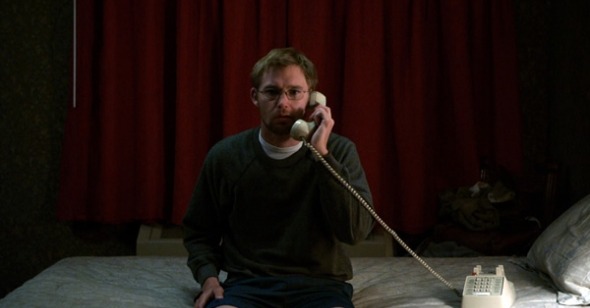Need You Closer
By Michael Koresky
Easier with Practice
Dir. Kyle Patrick Alvarez, U.S., Lantern Lane Entertainment
We needed another delicate, comedy-tinged American independent drama about a socially awkward, emotionally stunted creative guy who has a hard time communicating with girls like a hole in the head. At the very least, what immediately sets the new film Easier with Practice apart from many recent installments in this ever-ready subgenre is that first-time director Kyle Patrick Alvarez knows where to point a camera. As overly self-aware and photo-album-ready as much of the film’s shots are, especially in its opening moments, it’s clear that we’re in the hands of a genuine moviemaker. Unfortunately it takes a little digging to get past the received indie mannerisms (disaffected people in frozen tableaux of American nowheresville) to find approximations of recognizable human behavior in the film, an adaptation of a fact-based short story about a passive young writer, Davey (Brian Geraghty), who begins a phone-sex relationship with a woman who one night randomly calls his motel room while he’s on a book-reading tour of the American Southwest.
Alvarez’s first step in wrenching Easier with Practice out of its aesthetic stranglehold is acknowledging the importance of the close-up. For the film’s first fifteen minutes or so, everything is framed in long shot—austere, distant images of drab buildings situating Davey and his horndog brother, Sean (Kel O’Neill), usually filmed from outside. These nameless places often come with neon signifiers of American anonymity: a bookstore is called, simply, BOOKS; a café is named, you guessed it, CAFÉ. By the time the blazing words OFFICE LOBBY show up in the foreground, one may think they’ve entered the storybook parody of suburbia in Edward Scissorhands. Such forced shorthand for disconnection and homogeneity don’t bode well (and speak to the director’s youth). It’s little surprise that so many early scenes are done in show-offy single takes, most baldly the major, ten-minute shot chronicling Davey’s first telephone session with the mysterious Nicole. As the girl’s sultry voice cajoles the diffident Davey into masturbating with her, the camera slowly zooms into the bespectacled 28-year-old’s face, finally getting close enough to catch every trace of Geraghty’s remarkably artificial impersonation of an orgasm.
It’s an incredibly punishing shot, one that does a disservice to the actor at its center in favor of directorial bravado—cutaways and more choices from separate takes might have lessened the phoniness of the moment, and helped Geraghty find different ways of saying things like “I’m touching my privates.” It’s especially unfair because Geraghty is so persuasive in the rest of the film; from this point forward the camera is unafraid to get close to Davey, and it brings Easier with Practice into a stronger experiential realm. With his constantly unshaven face and neurotic, self-doubting cadence, Geraghty’s Davey might have been an insufferable caricature of reticence, but the actor provides enough glimmers of desired connection that he carries us through, even if we long for a dose of aesthetic daring, as in Paul Thomas Anderson’s thematically similar Punch-Drunk Love. Geraghty is especially sympathetic when pitted against Sean, most notably in a late-film game of “Two Truths and a Lie” that turns into an emotional familial battlefield; the Brian-Sean road-trip rivalry is undoubtedly telegraphed (cheating, sex-craved Sean, given to drawling things like, “Pussy . . . sweet,” is a close cousin to Thomas Haden Church’s piggish best friend in Sideways, which makes owlish writer Davey fairly Giamatti-esque in comparison), but Geraghty and O’Neill, both incidentally refugees from recent Iraq War films—The Hurt Locker and Redacted, respectively—play off of each other with effective seething fraternal contempt.
With a few memorable pit stops, including some immensely appealing supporting work by Marguerite Moreau (as the kind of potential love interest meant to have viewers screaming “Kiss her, already!”), Easier with Practice moves along engagingly to a twist ending that functions well conceptually, but in practice (meaning the way the film has been constructed to lead us astray) doesn’t work at all. The final destination of Alvarez’s debut reveals a richer film than we had perhaps anticipated, summoning questions about identity far more provocative than its depictions of disconnection and loneliness; but its last ten minutes open up previously hidden cans of worms the film is only just beginning to deal with. If this climactic event had taken place halfway through the film, the emotional fallout would have been trickier to reconcile. As is, it takes an easy way out—a pre-emptive cut to black that leaves things predictably, artfully unresolved.
